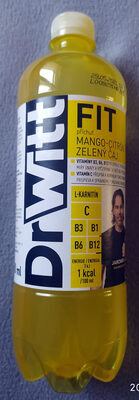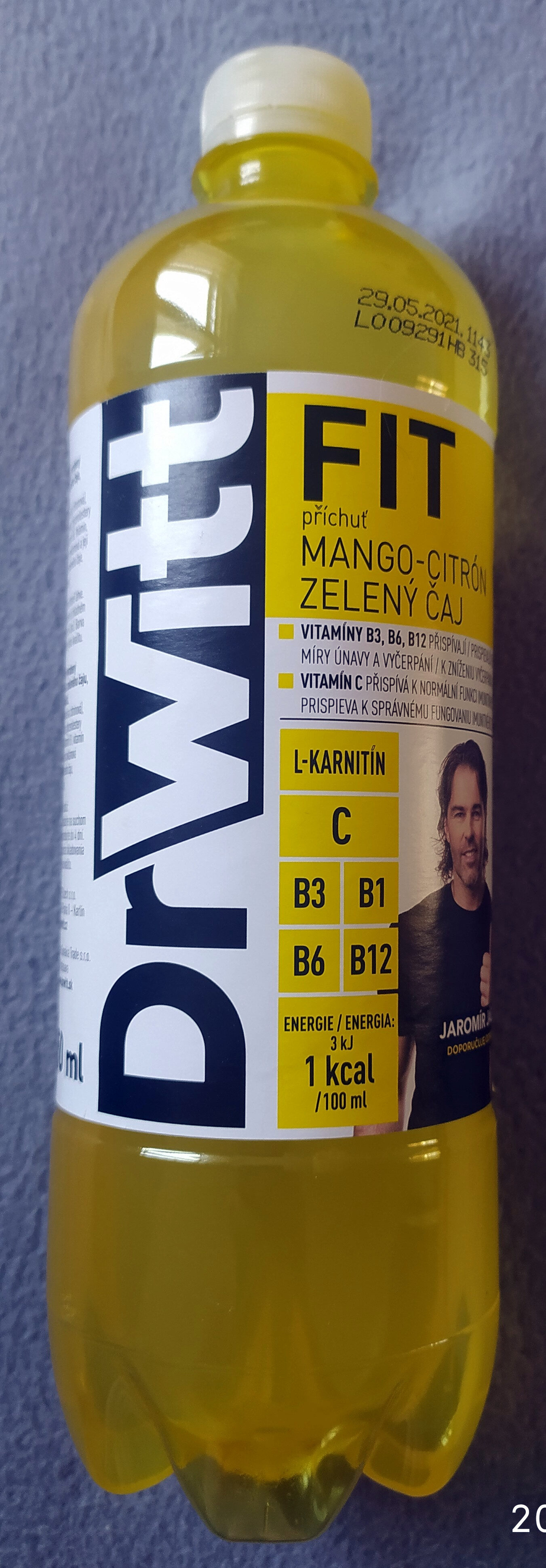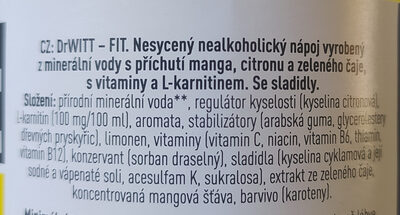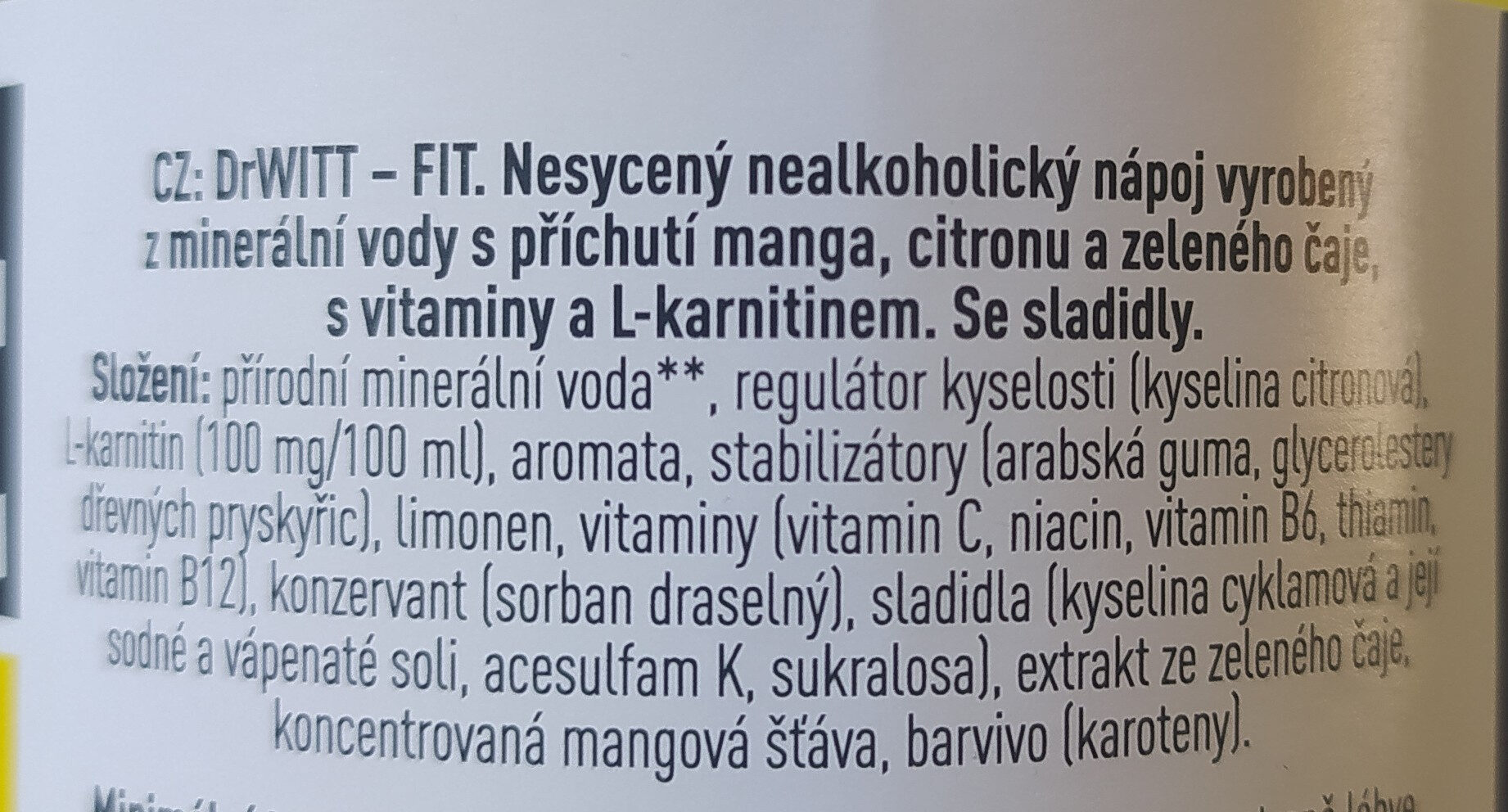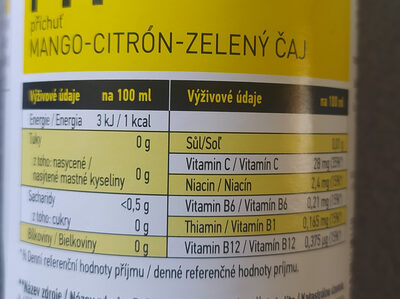Help us make food transparency the norm!
As a non-profit organization, we depend on your donations to continue informing consumers around the world about what they eat.
The food revolution starts with you!
Fit mango-citron zelený čaj - DrWitt - 750 ml
Fit mango-citron zelený čaj - DrWitt - 750 ml
This product page is not complete. You can help to complete it by editing it and adding more data from the photos we have, or by taking more photos using the app for Android or iPhone/iPad. Thank you!
×
Barcode: 8595646202847 (EAN / EAN-13)
Quantity: 750 ml
Packaging: Plastic, Pet-polyethylene-terephthalate
Brands: DrWitt
Categories: Beverages, Waters, Artificially sweetened beverages, Spring waters, Mineral waters
Manufacturing or processing places: Česká Republika
Stores: COOP
Countries where sold: Czech Republic
Matching with your preferences
Health
Ingredients
-
25 ingredients
natural mineral water**, acidity regulator (citric acid , l-carnitine (100 mg/100 ml), aromas, stabilisers (arabic gum, glycerosters of wood resusthes), limonene, vitamins (vitamin c, niacin, vitamin b6, thiamine, vitamin b12), preservative (potassium sorabine), sweeteners (cyclamoic acid and its sodium and calcium salts, acesulfame k, sucralose), green caj extract, concentrated mango juice, dye (carotene)
Food processing
-
Ultra processed foods
Elements that indicate the product is in the 4 - Ultra processed food and drink products group:
- Additive: E160a - Carotene
- Additive: E414 - Acacia gum
- Additive: E950 - Acesulfame k
- Additive: E955 - Sucralose
- Ingredient: Colour
- Ingredient: Flavouring
Food products are classified into 4 groups according to their degree of processing:
- Unprocessed or minimally processed foods
- Processed culinary ingredients
- Processed foods
- Ultra processed foods
The determination of the group is based on the category of the product and on the ingredients it contains.
Additives
-
E160a - Carotene
Carotene: The term carotene -also carotin, from the Latin carota, "carrot"- is used for many related unsaturated hydrocarbon substances having the formula C40Hx, which are synthesized by plants but in general cannot be made by animals -with the exception of some aphids and spider mites which acquired the synthesizing genes from fungi-. Carotenes are photosynthetic pigments important for photosynthesis. Carotenes contain no oxygen atoms. They absorb ultraviolet, violet, and blue light and scatter orange or red light, and -in low concentrations- yellow light. Carotenes are responsible for the orange colour of the carrot, for which this class of chemicals is named, and for the colours of many other fruits, vegetables and fungi -for example, sweet potatoes, chanterelle and orange cantaloupe melon-. Carotenes are also responsible for the orange -but not all of the yellow- colours in dry foliage. They also -in lower concentrations- impart the yellow coloration to milk-fat and butter. Omnivorous animal species which are relatively poor converters of coloured dietary carotenoids to colourless retinoids have yellowed-coloured body fat, as a result of the carotenoid retention from the vegetable portion of their diet. The typical yellow-coloured fat of humans and chickens is a result of fat storage of carotenes from their diets. Carotenes contribute to photosynthesis by transmitting the light energy they absorb to chlorophyll. They also protect plant tissues by helping to absorb the energy from singlet oxygen, an excited form of the oxygen molecule O2 which is formed during photosynthesis. β-Carotene is composed of two retinyl groups, and is broken down in the mucosa of the human small intestine by β-carotene 15‚15'-monooxygenase to retinal, a form of vitamin A. β-Carotene can be stored in the liver and body fat and converted to retinal as needed, thus making it a form of vitamin A for humans and some other mammals. The carotenes α-carotene and γ-carotene, due to their single retinyl group -β-ionone ring-, also have some vitamin A activity -though less than β-carotene-, as does the xanthophyll carotenoid β-cryptoxanthin. All other carotenoids, including lycopene, have no beta-ring and thus no vitamin A activity -although they may have antioxidant activity and thus biological activity in other ways-. Animal species differ greatly in their ability to convert retinyl -beta-ionone- containing carotenoids to retinals. Carnivores in general are poor converters of dietary ionone-containing carotenoids. Pure carnivores such as ferrets lack β-carotene 15‚15'-monooxygenase and cannot convert any carotenoids to retinals at all -resulting in carotenes not being a form of vitamin A for this species-; while cats can convert a trace of β-carotene to retinol, although the amount is totally insufficient for meeting their daily retinol needs.Source: Wikipedia
-
E202 - Potassium sorbate
Potassium sorbate (E202) is a synthetic food preservative commonly used to extend the shelf life of various food products.
It works by inhibiting the growth of molds, yeast, and some bacteria, preventing spoilage. When added to foods, it helps maintain their freshness and quality.
Some studies have shown that when combined with nitrites, potassium sorbate have genotoxic activity in vitro. However, potassium sorbate is generally recognized as safe (GRAS) by regulatory authorities.
-
E330 - Citric acid
Citric acid is a natural organic acid found in citrus fruits such as lemons, oranges, and limes.
It is widely used in the food industry as a flavor enhancer, acidulant, and preservative due to its tart and refreshing taste.
Citric acid is safe for consumption when used in moderation and is considered a generally recognized as safe (GRAS) food additive by regulatory agencies worldwide.
-
E414 - Acacia gum
Gum arabic: Gum arabic, also known as acacia gum, arabic gum, gum acacia, acacia, Senegal gum and Indian gum, and by other names, is a natural gum consisting of the hardened sap of various species of the acacia tree. Originally, gum arabic was collected from Acacia nilotica which was called the "gum arabic tree"; in the present day, gum arabic is collected from acacia species, predominantly Acacia senegal and Vachellia -Acacia- seyal; the term "gum arabic" does not indicate a particular botanical source. In a few cases so‐called "gum arabic" may not even have been collected from Acacia species, but may originate from Combretum, Albizia or some other genus. Producers harvest the gum commercially from wild trees, mostly in Sudan -80%- and throughout the Sahel, from Senegal to Somalia—though it is historically cultivated in Arabia and West Asia. Gum arabic is a complex mixture of glycoproteins and polysaccharides. It is the original source of the sugars arabinose and ribose, both of which were first discovered and isolated from it, and are named after it. Gum arabic is soluble in water. It is edible, and used primarily in the food industry as a stabilizer, with EU E number E414. Gum arabic is a key ingredient in traditional lithography and is used in printing, paint production, glue, cosmetics and various industrial applications, including viscosity control in inks and in textile industries, though less expensive materials compete with it for many of these roles. While gum arabic is now produced throughout the African Sahel, it is still harvested and used in the Middle East.Source: Wikipedia
-
E950 - Acesulfame k
Acesulfame potassium: Acesulfame potassium - AY-see-SUL-faym-, also known as acesulfame K -K is the symbol for potassium- or Ace K, is a calorie-free sugar substitute -artificial sweetener- often marketed under the trade names Sunett and Sweet One. In the European Union, it is known under the E number -additive code- E950. It was discovered accidentally in 1967 by German chemist Karl Clauss at Hoechst AG -now Nutrinova-. In chemical structure, acesulfame potassium is the potassium salt of 6-methyl-1‚2,3-oxathiazine-4-3H--one 2‚2-dioxide. It is a white crystalline powder with molecular formula C4H4KNO4S and a molecular weight of 201.24 g/mol.Source: Wikipedia
-
E955 - Sucralose
Sucralose: Sucralose is an artificial sweetener and sugar substitute. The majority of ingested sucralose is not broken down by the body, so it is noncaloric. In the European Union, it is also known under the E number E955. It is produced by chlorination of sucrose. Sucralose is about 320 to 1‚000 times sweeter than sucrose, three times as sweet as both aspartame and acesulfame potassium, and twice as sweet as sodium saccharin. Evidence of benefit is lacking for long-term weight loss with some data supporting weight gain and heart disease risks.It is stable under heat and over a broad range of pH conditions. Therefore, it can be used in baking or in products that require a long shelf life. The commercial success of sucralose-based products stems from its favorable comparison to other low-calorie sweeteners in terms of taste, stability, and safety. Common brand names of sucralose-based sweeteners are Splenda, Zerocal, Sukrana, SucraPlus, Candys, Cukren, and Nevella. Canderel Yellow also contains sucralose, but the original Canderel and Green Canderel do not.Source: Wikipedia
Ingredients analysis
-
May contain palm oil
Ingredients that may contain palm oil: E160a
-
Non-vegan
Non-vegan ingredients: L-carnitineSome ingredients could not be recognized.
We need your help!
You can help us recognize more ingredients and better analyze the list of ingredients for this product and others:
- Edit this product page to correct spelling mistakes in the ingredients list, and/or to remove ingredients in other languages and sentences that are not related to the ingredients.
- Add new entries, synonyms or translations to our multilingual lists of ingredients, ingredient processing methods, and labels.
If you would like to help, join the #ingredients channel on our Slack discussion space and/or learn about ingredients analysis on our wiki. Thank you!
-
Vegetarian status unknown
Unrecognized ingredients: cs:přírodní-minerální-voda, cs:stabilizátory, cs:glycerostery-dřevěných-pryskyřic, cs:limonen, cs:vitamin-c, cs:vitamin-b6, Thiamin, cs:vitamin-b12, cs:sladidla, cs:kyselina-cyklamova-a-její-sodné-a-vápenaté-soli, cs:extrakt-ze-zeleného-caj, cs:koncentrovaná-mangová-šťávaSome ingredients could not be recognized.
We need your help!
You can help us recognize more ingredients and better analyze the list of ingredients for this product and others:
- Edit this product page to correct spelling mistakes in the ingredients list, and/or to remove ingredients in other languages and sentences that are not related to the ingredients.
- Add new entries, synonyms or translations to our multilingual lists of ingredients, ingredient processing methods, and labels.
If you would like to help, join the #ingredients channel on our Slack discussion space and/or learn about ingredients analysis on our wiki. Thank you!
-
Details of the analysis of the ingredients
We need your help!
Some ingredients could not be recognized.
We need your help!
You can help us recognize more ingredients and better analyze the list of ingredients for this product and others:
- Edit this product page to correct spelling mistakes in the ingredients list, and/or to remove ingredients in other languages and sentences that are not related to the ingredients.
- Add new entries, synonyms or translations to our multilingual lists of ingredients, ingredient processing methods, and labels.
If you would like to help, join the #ingredients channel on our Slack discussion space and/or learn about ingredients analysis on our wiki. Thank you!
: Přírodní minerální voda, regulátor kyselosti, kyselina citronová, L-karnitin, aromata, stabilizátory (arabská guma, glycerostery dřevěných pryskyřic), limonen, vitaminy (vitamin C, niacin, vitamin B6, thiamin, vitamin B12), konzervant (sorban draselný), sladidla (kyselina cyklamova a její Sodné a vápenaté soli, acesulfam K, sukralosa), extrakt ze zeleného caj, koncentrovaná mangová šťáva, barvivo (karoten)- Přírodní minerální voda -> cs:přírodní-minerální-voda - percent_min: 7.69230769230769 - percent_max: 100
- regulátor kyselosti -> en:acidity-regulator - percent_min: 0 - percent_max: 50
- kyselina citronová -> en:e330 - vegan: yes - vegetarian: yes - percent_min: 0 - percent_max: 33.3333333333333
- L-karnitin -> en:l-carnitine - vegan: no - vegetarian: maybe - percent_min: 0 - percent_max: 25
- aromata -> en:flavouring - vegan: maybe - vegetarian: maybe - percent_min: 0 - percent_max: 5
- stabilizátory -> cs:stabilizátory - percent_min: 0 - percent_max: 5
- arabská guma -> en:e414 - vegan: yes - vegetarian: yes - percent_min: 0 - percent_max: 5
- glycerostery dřevěných pryskyřic -> cs:glycerostery-dřevěných-pryskyřic - percent_min: 0 - percent_max: 2.5
- limonen -> cs:limonen - percent_min: 0 - percent_max: 5
- vitaminy -> en:vitamins - vegan: yes - vegetarian: yes - percent_min: 0 - percent_max: 5
- vitamin C -> cs:vitamin-c - percent_min: 0 - percent_max: 5
- niacin -> en:e375 - vegan: maybe - vegetarian: maybe - percent_min: 0 - percent_max: 2.5
- vitamin B6 -> cs:vitamin-b6 - percent_min: 0 - percent_max: 1.66666666666667
- thiamin -> en:thiamin - percent_min: 0 - percent_max: 1.25
- vitamin B12 -> cs:vitamin-b12 - percent_min: 0 - percent_max: 1
- konzervant -> en:preservative - percent_min: 0 - percent_max: 5
- sorban draselný -> en:e202 - vegan: yes - vegetarian: yes - percent_min: 0 - percent_max: 5
- sladidla -> cs:sladidla - percent_min: 0 - percent_max: 5
- kyselina cyklamova a její Sodné a vápenaté soli -> cs:kyselina-cyklamova-a-její-sodné-a-vápenaté-soli - percent_min: 0 - percent_max: 5
- acesulfam K -> en:e950 - vegan: yes - vegetarian: yes - percent_min: 0 - percent_max: 2.5
- sukralosa -> en:e955 - vegan: yes - vegetarian: yes - percent_min: 0 - percent_max: 1.66666666666667
- extrakt ze zeleného caj -> cs:extrakt-ze-zeleného-caj - percent_min: 0 - percent_max: 5
- koncentrovaná mangová šťáva -> cs:koncentrovaná-mangová-šťáva - percent_min: 0 - percent_max: 5
- barvivo -> en:colour - percent_min: 0 - percent_max: 5
- karoten -> en:e160a - vegan: maybe - vegetarian: maybe - from_palm_oil: maybe - percent_min: 0 - percent_max: 5
Nutrition
-
Very good nutritional quality
This product is considered a beverage for the calculation of the Nutri-Score.
Positive points: 0
- Proteins: 0 / 5 (value: 0, rounded value: 0)
- Fiber: 0 / 5 (value: 0, rounded value: 0)
- Fruits, vegetables, nuts, and colza/walnut/olive oils: 0 / 10 (value: 0, rounded value: 0)
Negative points: 1
- Energy: 1 / 10 (value: 3, rounded value: 3)
- Sugars: 0 / 10 (value: 0, rounded value: 0)
- Saturated fat: 0 / 10 (value: 0, rounded value: 0)
- Sodium: 0 / 10 (value: 4, rounded value: 4)
The points for proteins are counted because the negative points are less than 11.
Nutritional score: (1 - 0)
Nutri-Score:
-
Nutrient levels
-
Fat in low quantity (0%)
What you need to know- A high consumption of fat, especially saturated fats, can raise cholesterol, which increases the risk of heart diseases.
Recommendation: Limit the consumption of fat and saturated fat- Choose products with lower fat and saturated fat content.
-
Saturated fat in low quantity (0%)
What you need to know- A high consumption of fat, especially saturated fats, can raise cholesterol, which increases the risk of heart diseases.
Recommendation: Limit the consumption of fat and saturated fat- Choose products with lower fat and saturated fat content.
-
Sugars in low quantity (0%)
What you need to know- A high consumption of sugar can cause weight gain and tooth decay. It also augments the risk of type 2 diabetes and cardio-vascular diseases.
Recommendation: Limit the consumption of sugar and sugary drinks- Sugary drinks (such as sodas, fruit beverages, and fruit juices and nectars) should be limited as much as possible (no more than 1 glass a day).
- Choose products with lower sugar content and reduce the consumption of products with added sugars.
-
Salt in low quantity (0.01%)
What you need to know- A high consumption of salt (or sodium) can cause raised blood pressure, which can increase the risk of heart disease and stroke.
- Many people who have high blood pressure do not know it, as there are often no symptoms.
- Most people consume too much salt (on average 9 to 12 grams per day), around twice the recommended maximum level of intake.
Recommendation: Limit the consumption of salt and salted food- Reduce the quantity of salt used when cooking, and don't salt again at the table.
- Limit the consumption of salty snacks and choose products with lower salt content.
-
-
Nutrition facts
Nutrition facts As sold
for 100 g / 100 mlCompared to: Mineral waters Energy 3 kj
(1 kcal)Fat 0 g Saturated fat 0 g Carbohydrates 0.5 g +258,967% Sugars 0 g Fiber 0 g Proteins 0 g Salt 0.01 g +22% Vitamin C (ascorbic acid) 28 mg Vitamin B1 (Thiamin) 0.165 mg Vitamin B3/PP (Niacin) 2.4 mg Vitamin B6 (Pyridoxin) 0.21 mg Vitamin B12 (cobalamin) 375 µg Fruits‚ vegetables‚ nuts and rapeseed‚ walnut and olive oils (estimate from ingredients list analysis) 0 %
Environment
-
Eco-Score not yet applicable
Not yet applicable for the category: Waters
The Eco-Score is not yet applicable for this category, but we are working on adding support for it.
Packaging
-
Packaging with a medium impact
-
Packaging parts
(PET 1 - Polyethylene terephthalate)
-
Packaging materials
Material % Packaging weight Packaging weight per 100 g of product Plastic
-
Transportation
-
Origins of ingredients
Missing origins of ingredients information
⚠ ️ The origins of the ingredients of this product are not indicated.
If they are indicated on the packaging, you can modify the product sheet and add them.
If you are the manufacturer of this product, you can send us the information with our free platform for producers.Add the origins of ingredients for this product Add the origins of ingredients for this product
Report a problem
-
Incomplete or incorrect information?
Category, labels, ingredients, allergens, nutritional information, photos etc.
If the information does not match the information on the packaging, please complete or correct it. Open Food Facts is a collaborative database, and every contribution is useful for all.
Data sources
Product added on by freiby
Last edit of product page on by roboto-app.
Product page also edited by inf, openfoodfacts-contributors, packbot, spotter.
